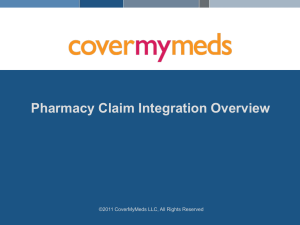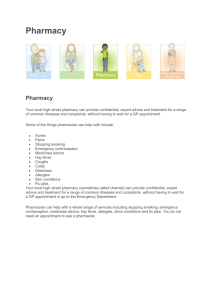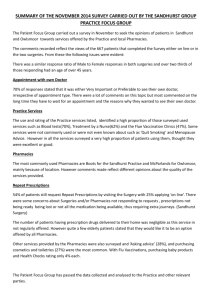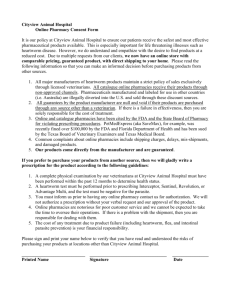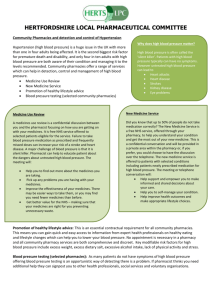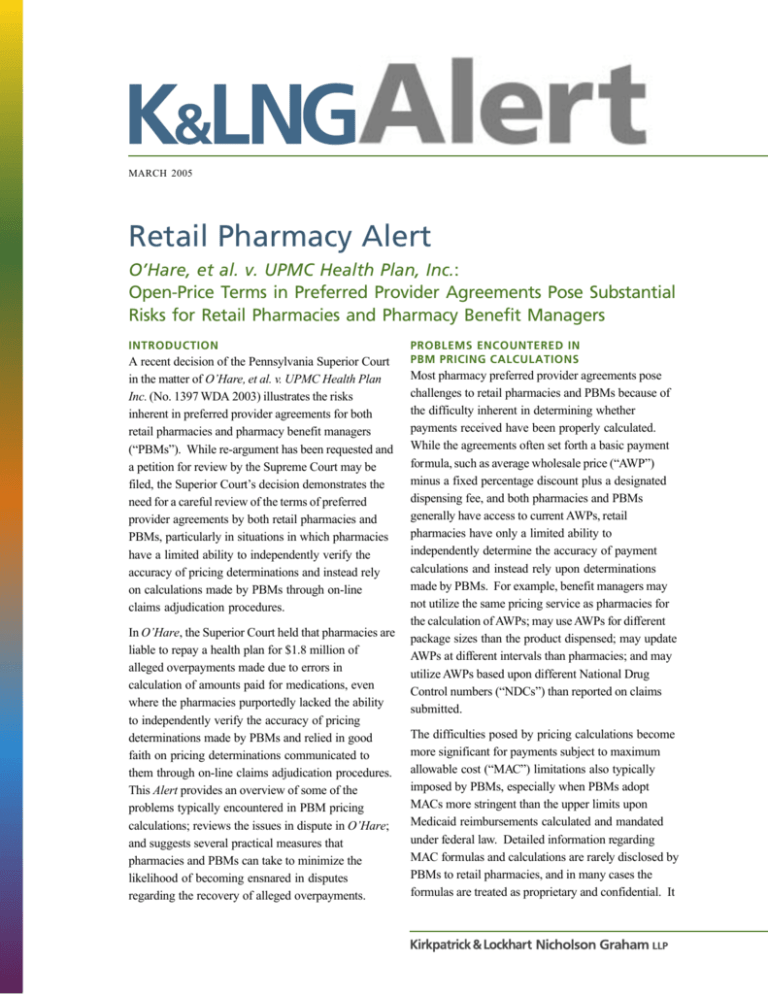
MARCH 2005
Retail Pharmacy Alert
O’Hare, et al. v. UPMC Health Plan, Inc.:
Open-Price Terms in Preferred Provider Agreements Pose Substantial
Risks for Retail Pharmacies and Pharmacy Benefit Managers
INTRODUCTION
A recent decision of the Pennsylvania Superior Court
in the matter of O’Hare, et al. v. UPMC Health Plan
Inc. (No. 1397 WDA 2003) illustrates the risks
inherent in preferred provider agreements for both
retail pharmacies and pharmacy benefit managers
(“PBMs”). While re-argument has been requested and
a petition for review by the Supreme Court may be
filed, the Superior Court’s decision demonstrates the
need for a careful review of the terms of preferred
provider agreements by both retail pharmacies and
PBMs, particularly in situations in which pharmacies
have a limited ability to independently verify the
accuracy of pricing determinations and instead rely
on calculations made by PBMs through on-line
claims adjudication procedures.
In O’Hare, the Superior Court held that pharmacies are
liable to repay a health plan for $1.8 million of
alleged overpayments made due to errors in
calculation of amounts paid for medications, even
where the pharmacies purportedly lacked the ability
to independently verify the accuracy of pricing
determinations made by PBMs and relied in good
faith on pricing determinations communicated to
them through on-line claims adjudication procedures.
This Alert provides an overview of some of the
problems typically encountered in PBM pricing
calculations; reviews the issues in dispute in O’Hare;
and suggests several practical measures that
pharmacies and PBMs can take to minimize the
likelihood of becoming ensnared in disputes
regarding the recovery of alleged overpayments.
PROBLEMS ENCOUNTERED IN
PBM PRICING CALCULATIONS
Most pharmacy preferred provider agreements pose
challenges to retail pharmacies and PBMs because of
the difficulty inherent in determining whether
payments received have been properly calculated.
While the agreements often set forth a basic payment
formula, such as average wholesale price (“AWP”)
minus a fixed percentage discount plus a designated
dispensing fee, and both pharmacies and PBMs
generally have access to current AWPs, retail
pharmacies have only a limited ability to
independently determine the accuracy of payment
calculations and instead rely upon determinations
made by PBMs. For example, benefit managers may
not utilize the same pricing service as pharmacies for
the calculation of AWPs; may use AWPs for different
package sizes than the product dispensed; may update
AWPs at different intervals than pharmacies; and may
utilize AWPs based upon different National Drug
Control numbers (“NDCs”) than reported on claims
submitted.
The difficulties posed by pricing calculations become
more significant for payments subject to maximum
allowable cost (“MAC”) limitations also typically
imposed by PBMs, especially when PBMs adopt
MACs more stringent than the upper limits upon
Medicaid reimbursements calculated and mandated
under federal law. Detailed information regarding
MAC formulas and calculations are rarely disclosed by
PBMs to retail pharmacies, and in many cases the
formulas are treated as proprietary and confidential. It
is, therefore, often difficult, if not impossible, for retail
pharmacies to monitor the accuracy of pricing
determinations made by PBMs. Similar problems also
emerge when PBMs rely upon wholesale acquisition
costs (“WACs”) rather than AWPs, because information
regarding WACs is rarely available at the retail
pharmacy level.
The uncertainty created by the lack of transparency in
most PBM pricing calculations is compounded by the
rapid pace at which changes occur in the competitive
and dynamic wholesale drug marketplace. Because of
the limited availability of information and the
complexity inherent in most pricing determinations,
errors in pricing calculations are difficult to avoid and
may occur with more frequency than is generally
understood or acknowledged by both pharmacies and
PBMs.
Fortunately, the lack of certainty in PBM pricing is
offset in most cases by the availability of real-time onlines claims adjudication. Using identification cards
issued to patients, before accepting a prescription and
submitting a claim for reimbursement, pharmacies are
usually able to ascertain the amounts that will be paid
for a particular medication and decide on a case-bycase basis whether to accept a prescription. Where
pharmacies elect to accept payments offered, however,
and PBMs subsequently attempt to retroactively
adjust payment amounts, pharmacies may be denied
the compensation they agreed to accept. The O’Hare
litigation evidences these perils.
THE O’HARE, ET AL. V. UPMC
HEALTH PLAN DISPUTE
In O’Hare, the UPMC Health Plan established a
pharmacy integrated delivery system as authorized by
the Pennsylvania Insurance Code pursuant to a
contract awarded by UPMC, as the result of an RFP
process, to Giant Eagle, Inc. The contract designated
Giant Eagle as the exclusive chain pharmacy
authorized to provide services to its policyholders in
portions of Western Pennsylvania based upon a
pricing proposal submitted by Giant Eagle, but
authorized additional independent pharmacies, which
agreed to accept the payment terms negotiated by
UPMC and Giant Eagle, to participate in the network
as necessary to provide adequate access to pharmacy
services for UPMC’s policyholders.1 Once the Giant
Eagle network was established, UPMC contracted
with ProVantage to provide claims processing and
administrative services. The agreement between
ProVantage and UPMC was terminated, however, on
June 1, 2001, when ProVantage was acquired by
Merck-Medco. Thereafter, UPMC contracted with
Argus Health Systems, Inc. for pharmacy claims
processing services.
The dispute that led to the litigation arose when,
according to UPMC, Argus erroneously overpaid
pharmacies participating in the Giant Eagle network
between June 1, 2001 and May 31, 2002 by
approximately $9 million. The errors by Argus
primarily involved the manner in which payments
were calculated for generic medications, especially
medications subject to MAC limits. On August 7,
2002, UPMC advised members of its pharmacy
network that it intended to recover the alleged
overpayments as an offset against future accounts
receivable. Giant Eagle, as a party to pricing
agreement with UPMC and as a significant beneficiary
of the closed pharmacy network, elected not to
challenge the reduced payments. The majority of the
independent pharmacy members of the network,
however, initiated an action in the Allegheny County
Court of Common Pleas seeking to block the recovery
of approximately $1.8 million of the alleged
overpayments.
On December 17, 2003 the Court of Common Pleas
issued a permanent injunction barring the recovery of
the alleged overpayments made to the independent
pharmacy plaintiffs. The Court of Common Pleas held
that the health plan had entered into participating
provider agreements with an “open price term” subject
to determination through an on-line claims
adjudication process. According to the Court of
Common Pleas, the agreements between the health
plan and participating pharmacies provided that
UPMC would electronically advise pharmacies of
amounts to be paid for particular prescriptions, which
1 UPMC also administered a similar Medicaid pharmacy network, but pursuant to Pennsylvania’s “any willing provider” law was
required to allow unrestricted participation in the network by other pharmacies willing to accept the same pricing parameters as
established by UPMC and Giant Eagle.
2 MARCH 2005
KIRKPATRICK & LOCKHART NICHOLSON GRAHAM LLP
might change literally from prescription to
prescription, subject to acceptance or rejection by
participating pharmacies. Although the participating
provider agreements also authorized audits to be
conducted by UPMC or its agents and provided for
the recovery of payments not supported by audit
findings, the Court concluded that audits were limited
to a review of the books, records, invoices and files of
participating pharmacies and did not provide for
recovery of alleged overpayments made because of
unilateral errors committed by Argus.
In a terse and sparsely explicated decision, on
January 25, 2005, the Superior Court reversed the
ruling of the Court of Common Pleas and held that,
because the agreements between the health plan and
network pharmacies set forth pricing formulas based
upon benchmarks, such as AWPs, MACs and usual and
customary charges, price was not an “open element”
under the agreements. Without acknowledging or
even discussing any of the complexities of AWP or
MAC calculations, the Court concluded that “the
agreement between UPMC and each pharmacy
specifically delineates a specific and verifiable pricing
methodology.”
Responding to the trial court’s finding that the
pharmacy agreements provided for an on-line claims
adjudication process pursuant to which retail
pharmacies could accept or reject specific
prescriptions based upon the amount of payment
offered, the Superior Court interpreted the preferred
provider agreements as only allowing a pharmacy to
refuse to dispense prescriptions based upon issues of
professional judgment and not based upon concerns
regarding the adequacy of reimbursement. Although
the Superior Court acknowledged that a report
prepared by UPMC regarding the overpayments
acknowledged that in practice pharmacists “may
either accept the price presented and complete the
transaction, or elect not to fill the prescription if the
pharmacist feels the reimbursement amount is not
comparable with cost,” the Court disregarded the
report as “not a part of the agreement between UPMC
and the appellees.” Unfortunately, the Superior Court
failed to address the extent to which the report
prepared by UPMC provided documentation of a
custom and usage that may be relied upon to interpret
3 MARCH 2005
or supplement the terms of a written agreement
pursuant to Article II of the Uniform Commercial Code
and well-recognized principles of common law.
The Superior Court also reversed the finding of the
trial court that UPMC could not recover overpayments
because the overpayments were not the result of the
conduct of pharmacies as discovered pursuant to
audits. Although the Superior Court acknowledged
that the preferred provider agreements only authorized
the recovery of payments not supported by audits of
pharmacy records, the Court found that there was no
basis in the trial court’s decision upon which “to
conclude that [access to pharmacy audits] was not, in
fact, necessary in order for UPMC to discover the
pricing error.” In arriving at this conclusion, the
Superior Court apparently overlooked or disregarded
the trial court’s finding that the pricing errors occurred
through no fault of the retail pharmacies, but instead
“was the fault of either UPMC or its agent, Argus.”
STEPS TO MINIMIZE THE RISK OF
PAYMENT CALCULATION DISPUTES
Regardless of whether the January 24, 2005 decision
of the Pennsylvania Superior Court is subsequently
modified or vacated, a review of the dispute as
presented by the O’Hara, et al. v. UPMC Health Plan,
Inc. litigation suggests the need for more careful
scrutiny of the terms of preferred provider agreements
by retail pharmacies and PBMs. In particular,
pharmacies and PBMs may wish to consider
modifications in preferred provider agreements in the
following areas to avoid payment disputes:
1. Extent of Reliance on On-Line Claims Adjudication.
Preferred provider agreements should carefully
describe the extent to which on-line claims
adjudications procedures will be utilized and should
specifically address the question of whether
pharmacies may refuse to dispense prescriptions based
on on-line pricing calculations. To the extent PBMs
wish to guarantee access to service for policyholders,
but retail pharmacies are unwilling to provide carte
blanche to PBM pricing calculations, agreements
should either specify classes of prescriptions (based
upon types of medications or payment metrics) for
which pharmacies may turn away patients or allow
pharmacies to dispense the prescriptions and request
an override of on-line payment calculations.
KIRKPATRICK & LOCKHART NICHOLSON GRAHAM LLP
misunderstandings will be reduced. Where it is
impossible or impractical to set forth detailed payment
practices in preferred provider agreements, periodic
notifications regarding detailed payment policies for
particular health care plans or employers should be
provided to pharmacies and pharmacies should be
afforded an opportunity to accept, reject or seek
modifications of payment terms.
2. Scope of Audit Authority.
Pharmacy agreements should clarify whether the
recovery of overpayments is limited to situations in
which pharmacies fail to utilize proper dispensing
practices or whether broader authority is provided for
retrospective claims review. For example, agreements
should clarify the extent to which overpayments can
be recovered for good-faith errors in payment
calculations by PBMs and whether payments to
pharmacies may be denied or reversed based upon
subsequent reviews of the medical necessity or
appropriateness of particular prescriptions. One useful
approach may be to allow the recovery of payments
inconsistent with usual and customary practices or
based on manifest error, but to otherwise allow
pharmacies to rely upon on-line claims calculations.
In this regard, the inclusion of a reasonable set of
mutual warranties and representations in preferred
agreements defining the roles and responsibilities of
pharmacies and PBMs may be helpful to minimize not
only payment disputes, but a variety of other difficult
issues that may arise under preferred provider
agreements.
4. Reliance on Alternative Dispute Resolution.
While many lawyers justifiably caution clients against
the risks of binding arbitration, the length and
complexity of the O’Hare litigation illustrates the
substantial efficiencies that alternative dispute
resolution procedures may provide. Retail pharmacies
and PBMs should evaluate whether mediation and
arbitration protocols can be established that are
speedy, efficient and ensure mutual confidence in the
fairness and impartiality of decisions, even if specific
outcomes are at times inherently unpredictable and
somewhat arbitrary. In particular, through negotiation
and the avoidance of cookie-cutter mediation and
arbitration clauses, retail pharmacies and PBMs
should give careful consideration to whether
alternative dispute resolution processes can be
implemented that incorporate procedures and
personnel well-adapted to the realities of the retail
pharmacy industry.
3. The Importance of Transparency.
There is no better mechanism for minimizing payment
disputes than seeking greater clarity and an enhanced
understanding of payment policies and practices.
While there will always be uncertainty in any
payment calculations, to the extent payment formulas
are described in greater detail, especially for the
establishment of MAC limits, the potential for
Raymond P. Pepe
rpepe@klng.com
717.231.5988
If you have questions or would like more information about K&LNG, please contact one of our lawyers listed below:
Harrisburg
Raymond P. Pepe
David R. Overstreet
717.231.5988
717.231.4517
rpepe@klng.com
doverstreet@klng.com
www
w.. k l n g . c o m
BOSTON
■
DALLAS
■
HARRISBURG
■
LONDON
■
LOS ANGELES
■
MIAMI NEWARK
■
■
NEW YORK PITTSBURGH
■
■
SAN FRANCISCO
■
WASHINGTON
Kirkpatrick & Lockhart Nicholson Graham is a combination of two limited liability partnerships, each named Kirkpatrick & Lockhart Nicholson Graham LLP, one established in Delaware,
USA, and one incorporated in England.
This publication/newsletter is for informational purposes and does not contain or convey legal advice. The information herein should not be used or relied upon in regard to any particular
facts or circumstances without first consulting a lawyer.
Unless otherwise indicated, the lawyers are not certified by the Texas Board of Legal Specialization.
Data Protection Act 1998 - We may contact you from time to time with information on Kirkpatrick & Lockhart Nicholson Graham LLP seminars and with our regular newsletters, which may be
of interest to you. We will not provide your details to any third parties. Please e-mail cgregory@klng.com if you would prefer not to receive this information.
© 2005 KIRKPATRICK & LOCKHART NICHOLSON GRAHAM LLP. ALL RIGHTS RESERVED.

